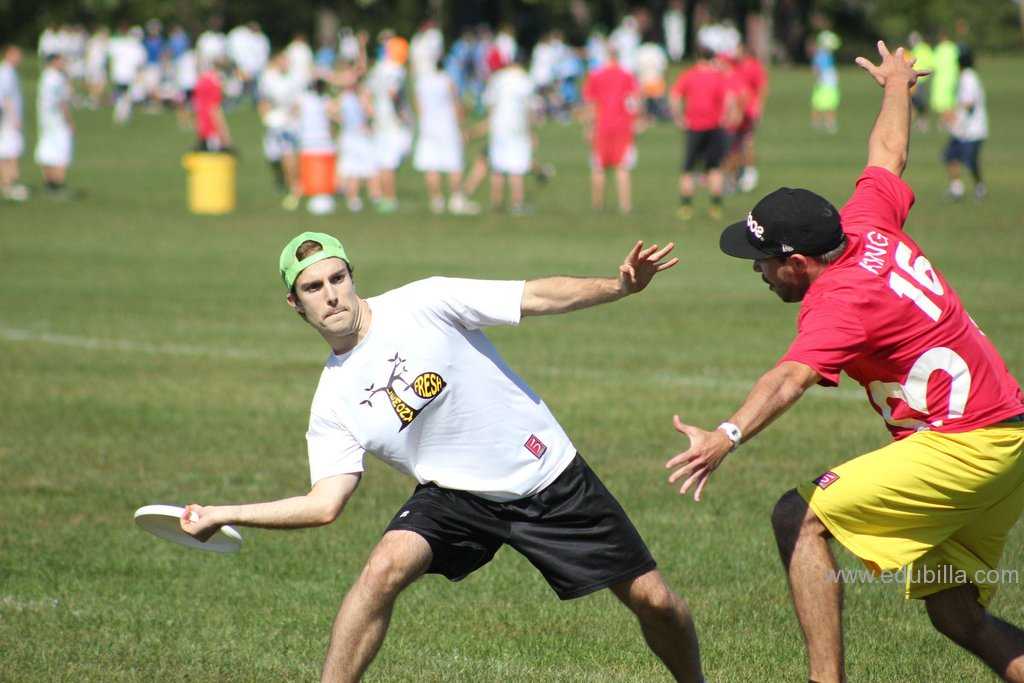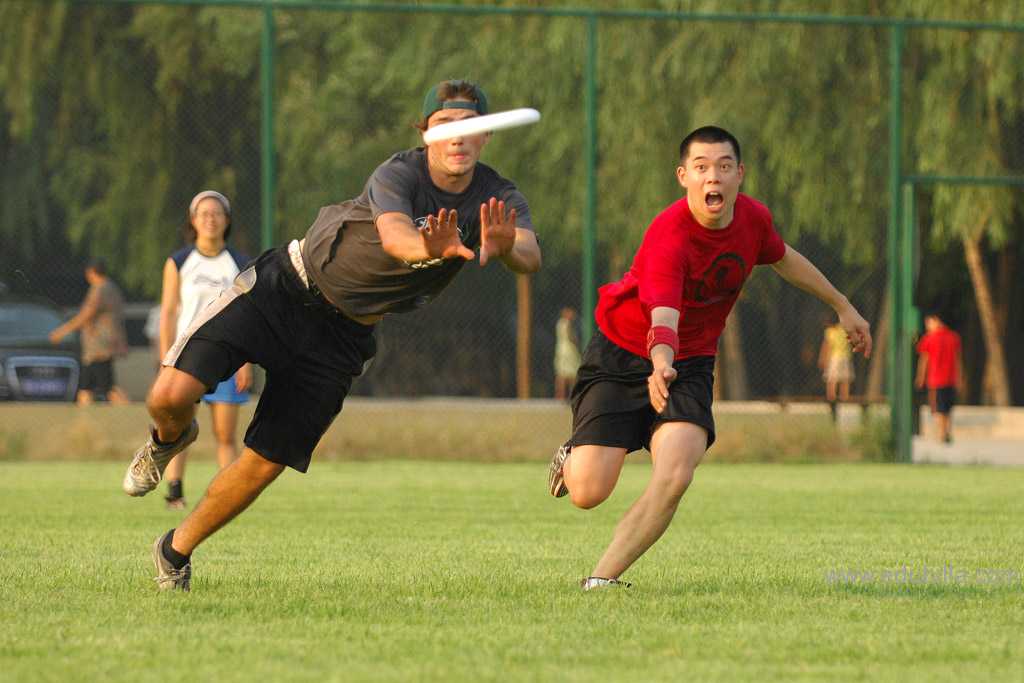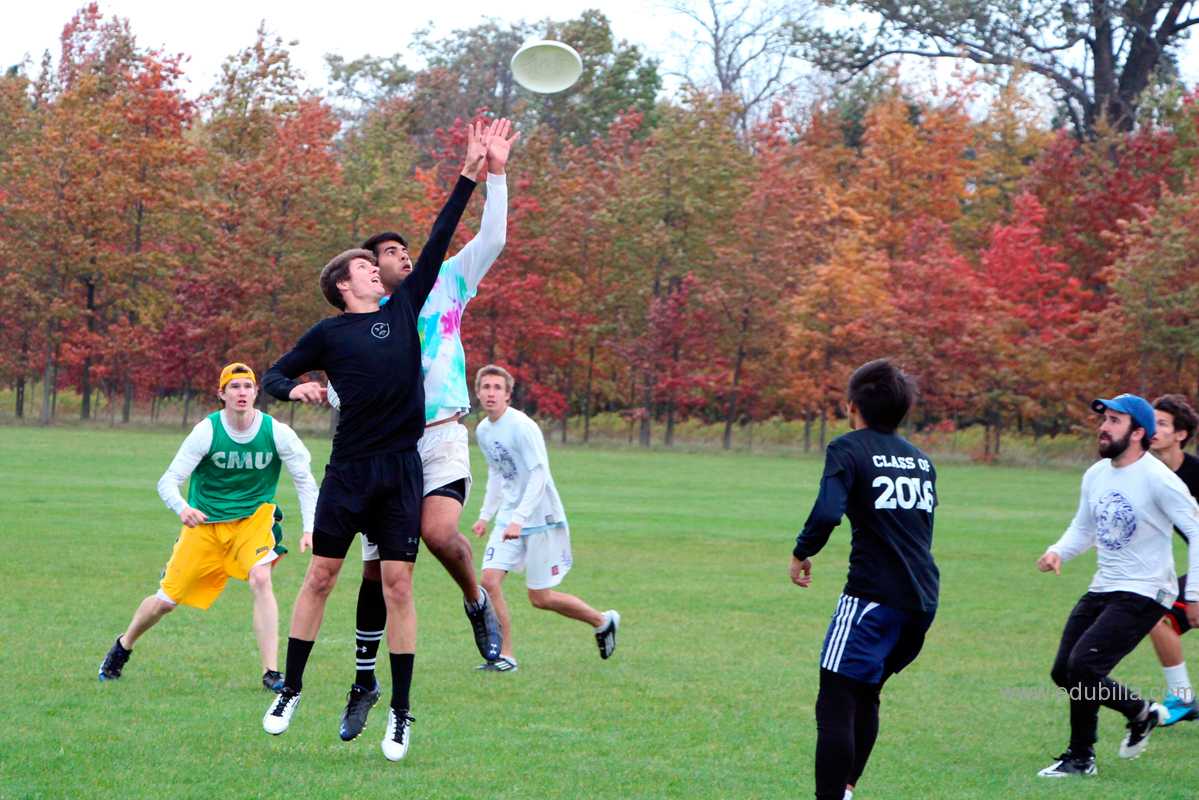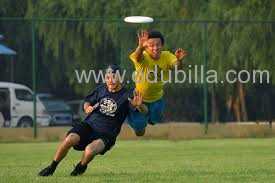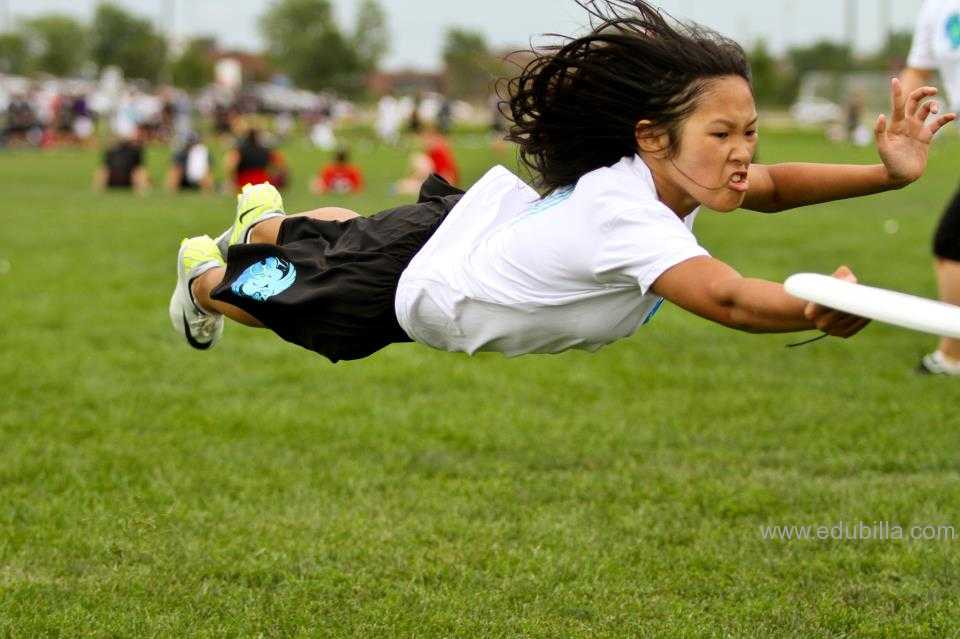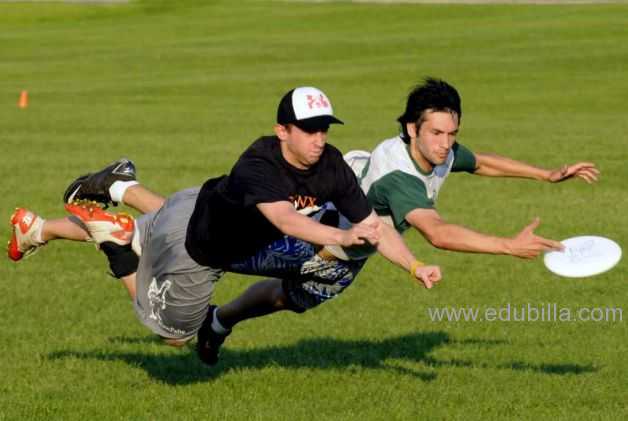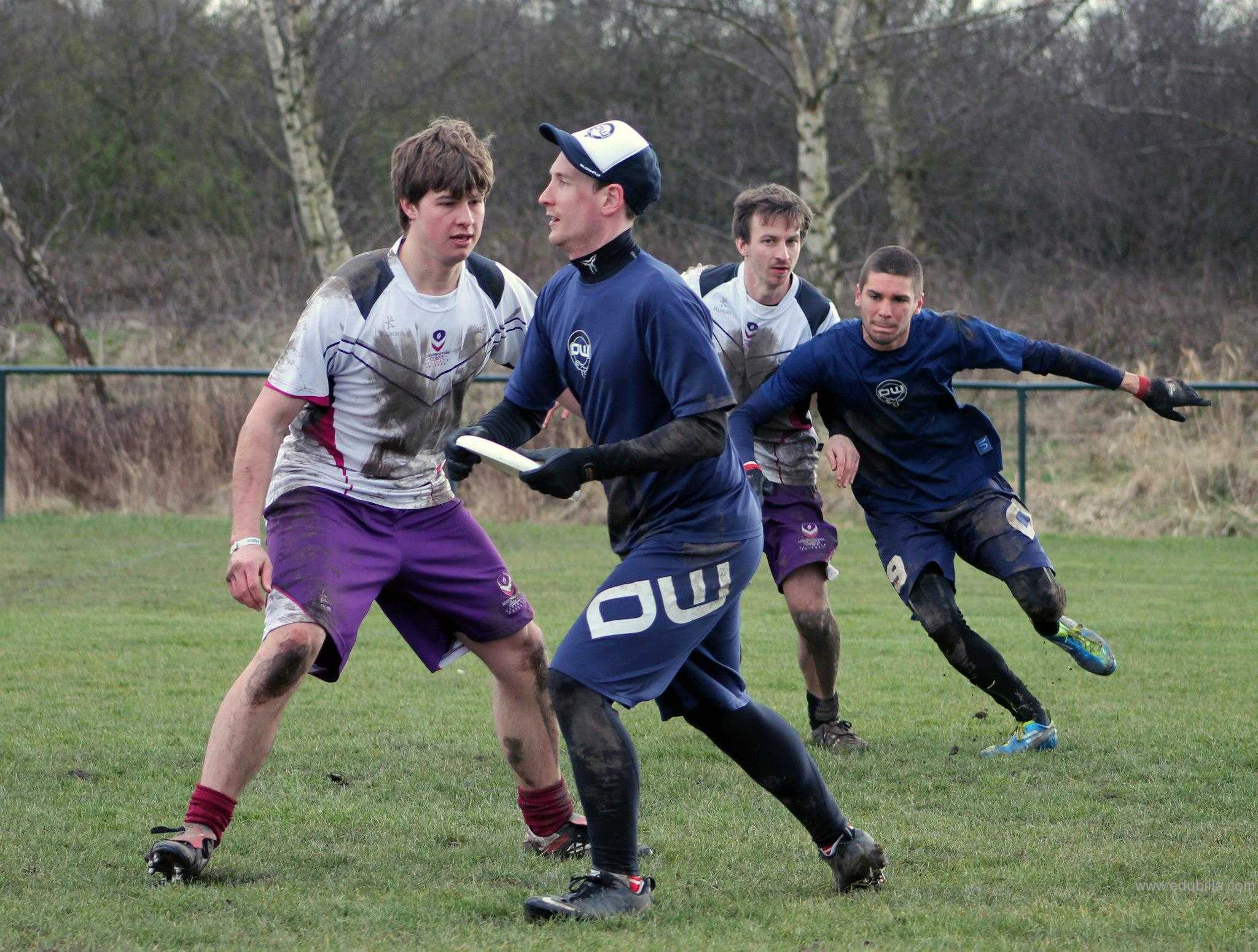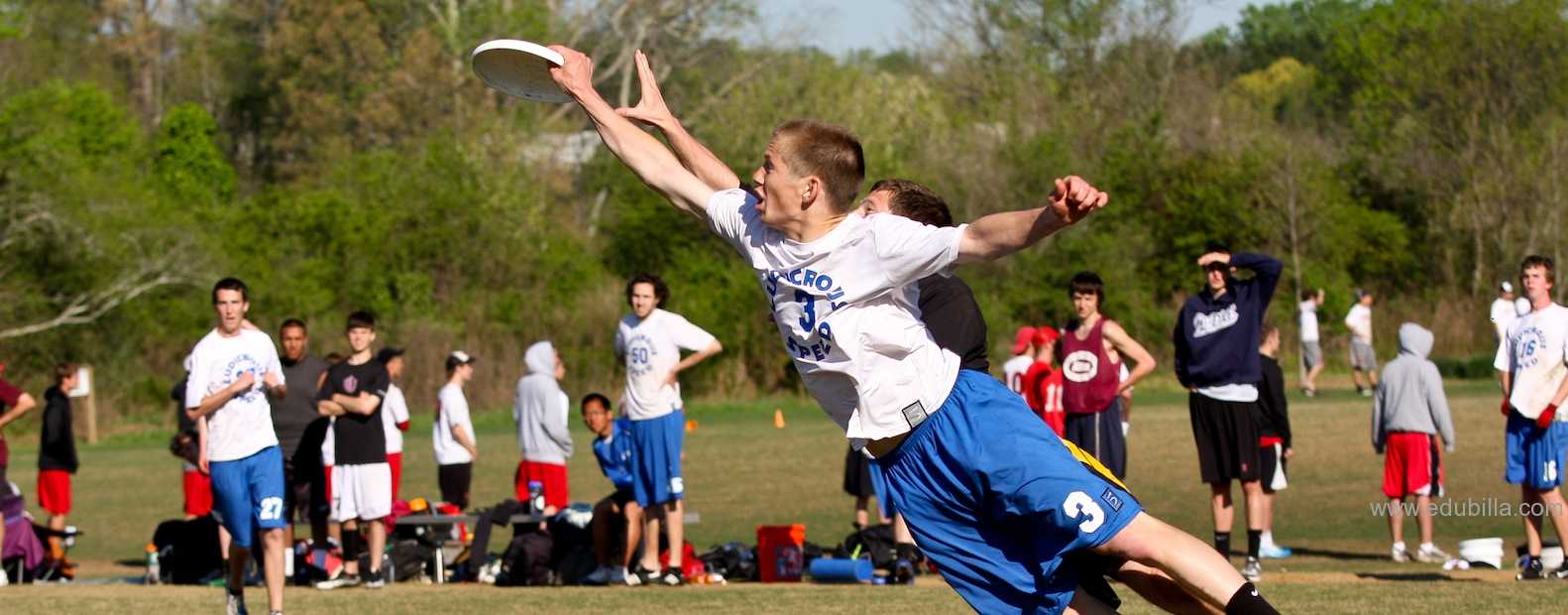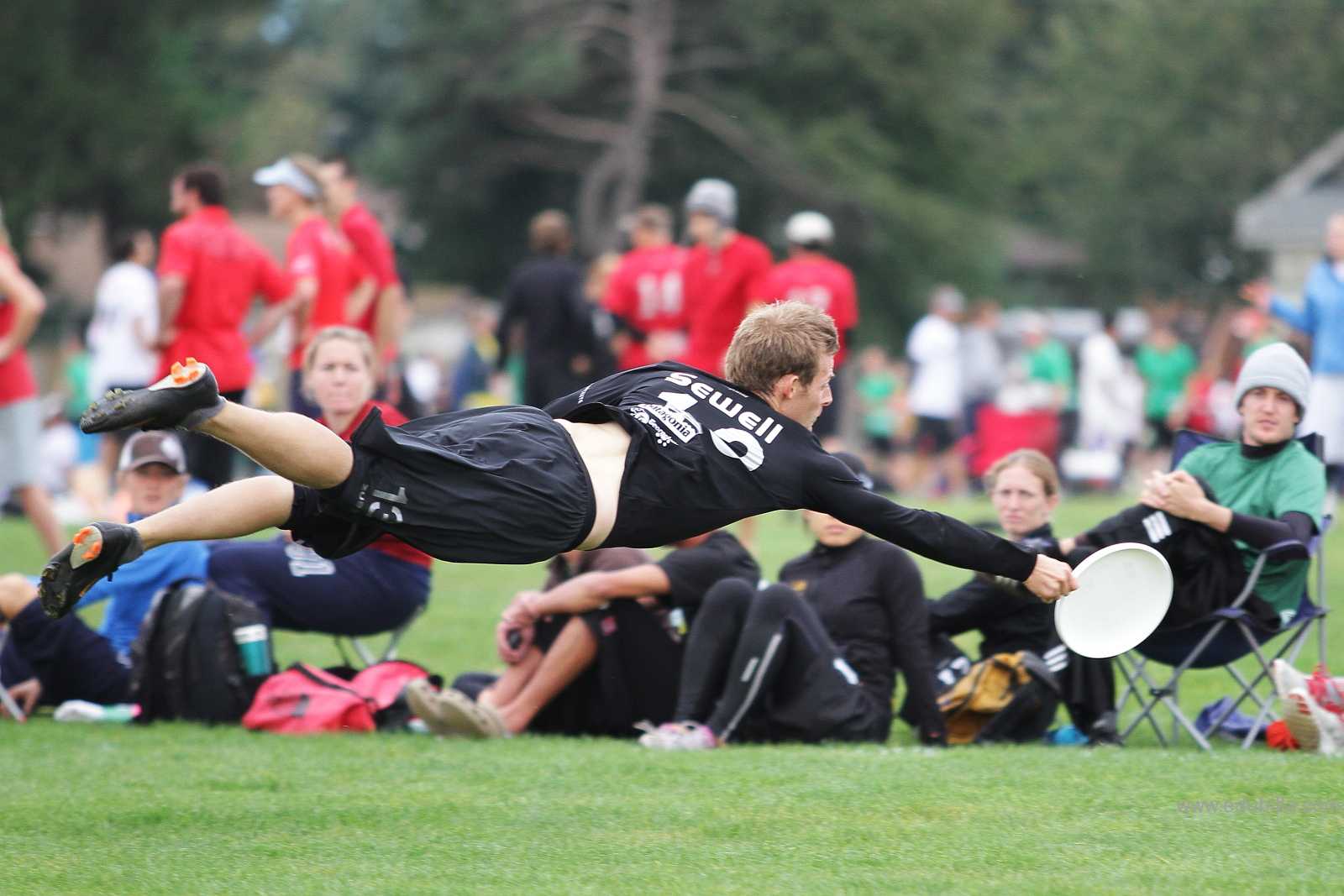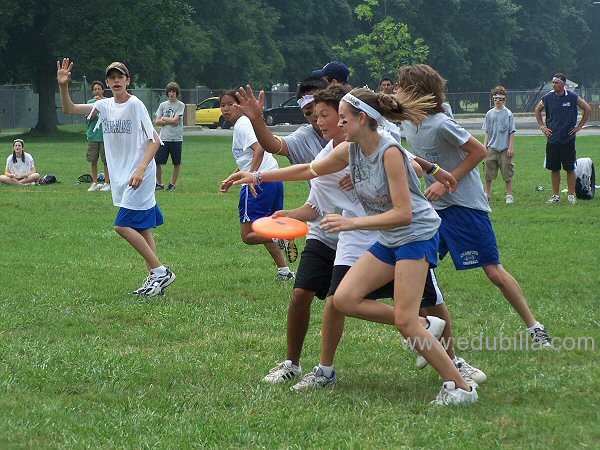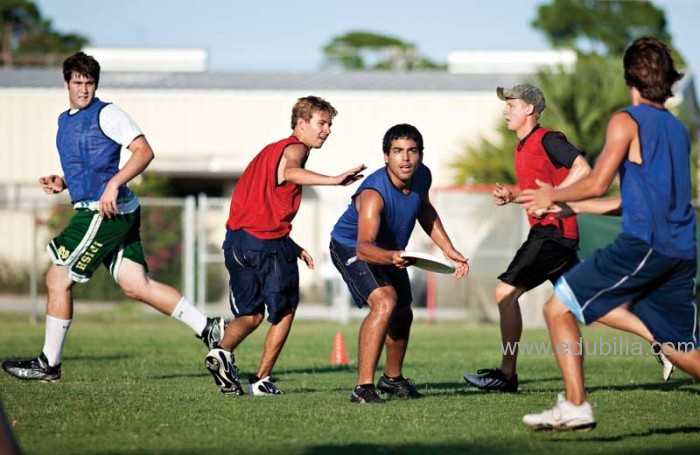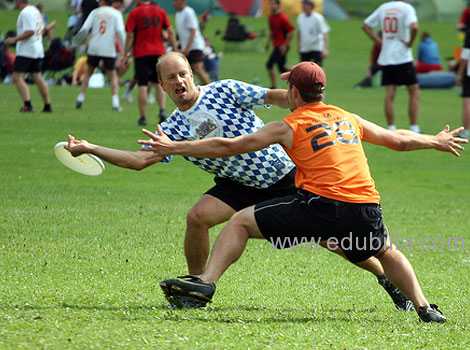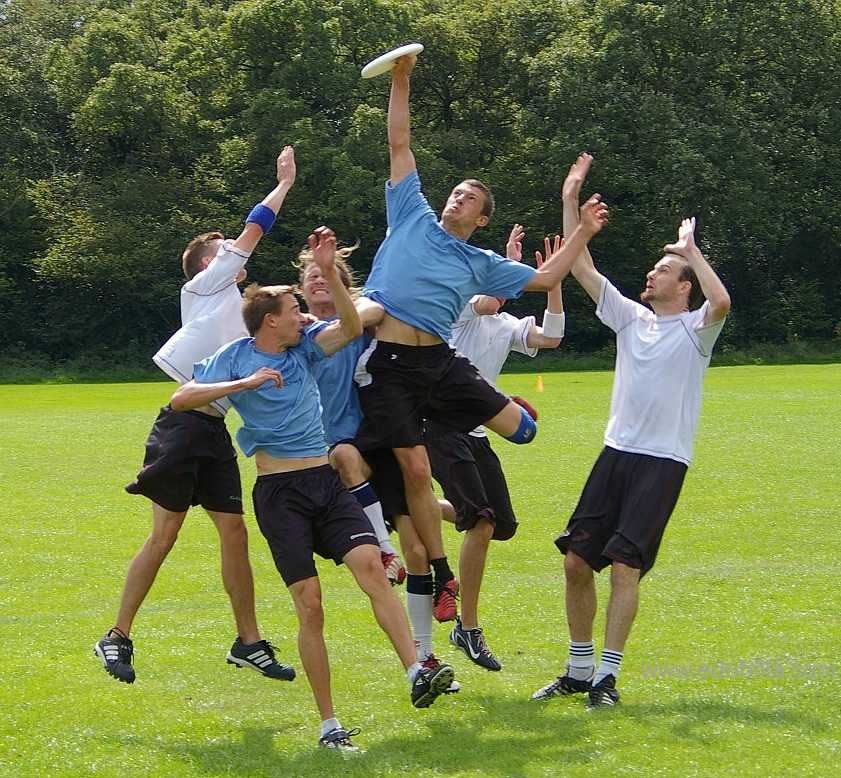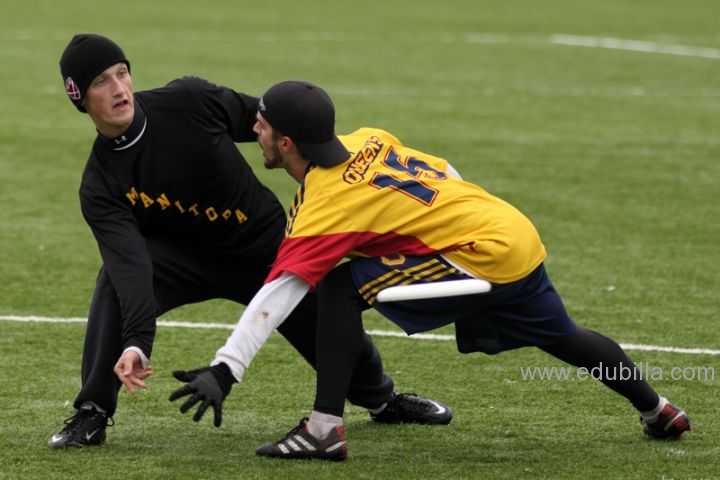
Overview Of Ultimate (sport)
Ultimate, also known as ultimate frisbee, is a limited-contact team field sport played with a flying disc, usually called the disc or frisbee. Points are scored by passing the disc to a teammate in the opposing end zone. Other basic rules are that players must not take steps while holding the disc, and interceptions, incomplete passes, and passes out of bounds are turnovers. Rain, wind, or occasionally other adversities can make for a testing match with rapid turnovers, heightening the pressure of play. A prominent feature of the modern game is the "lay out," a horizontal dive to catch or block the disc.
American counterculture:
From its beginnings in the American counterculture of the late 1960s, ultimate has resisted empowering any referee with rule enforcement, instead relying on the sportsmanship of players and invoking the "spirit of the game" to maintain fair play. Players call their own fouls and dispute a foul only when they genuinely believe it did not occur. Playing without referees is the norm for league play, but has been supplanted in club competition by the use of "observers"/"advisers" to help in disputes, and the nascent professional leagues even employ empowered referees.
In 2012 there were 5.1 million ultimate players in the United States.Ultimate is played across the world in pickup games and by recreational, school, club, professional, and national teams at various age levels and with open, women's, and mixed tournaments. The 13th quadrennial national team World Championships were held in Sakai, Japan in July, 2012. The United States won in the open and women masters' divisions, Japan won the women's tournament, and Canada took the mixed and male masters' titles
Players Associations:
In late December 1979, the first national player-run ultimate organization was founded in the United States as the Ultimate Players Association (UPA). Tom Kennedy was elected its first director. Before the UPA, events had been sponsored by the International Frisbee Association (IFA), a promotional arm of Wham-O.
UPA:
The UPA organized regional tournaments and has crowned a national champion every year since 1979. Glassboro State College defeated the Santa Barbara Condors 19-18 at the first UPA Nationals in 1979.
In 2010, the UPA rebranded itself as USA Ultimate.
First European Championship:
The first European Championship tournament for national teams was held in 1980 in Paris. Finland won, with England and Sweden finishing second and third. In 1981 the European Flying Disc Federation (EFDF) was formed. In 1984 the World Flying Disc Federation was formed by the EFDF to be the international governing body for disc sports.The first World Championships tournament was held in 1983 in Gothenburg, Sweden.
First Canadian National Ultimate Championships:
Ultimate Canada is the national governing body in Canada. The first Canadian National Ultimate Championships were held in Ottawa 1987.
European Ultimate Federation:
The European Ultimate Federation is the governing body for the sport of Ultimate in Europe. Funded in 2009, it is part of the European Flying Disc Federation (EFDF) and of the World Flying Disc Federation
British Universities and Colleges Sport:
In 2006 ultimate became a BUCS accredited sport at UK universities for both indoor and outdoor open division events.
WFDF:
The WFDF was granted full IOC recognition on 2 Aug 2015. This allows the possibility for the organization to receive IOC funding and become an Olympic Game.
Game Rules
The Aim of the Game:
Ultimate is a non-contact, self-refereed team sport played with a flying disc (or Frisbee™).
Two teams of seven players compete on a playing field about the same length as a football field, but narrower. At each end of the playing field there is an end zone. Each team defends one endzone. They score a goal if one of their players catches the disc in the opposite end zone.
The player with the disc is called the thrower. The thrower may not run with the disc. Instead they move the disc by passing to team-mates in any direction.
The defensive team gets possession of the disc if an offensive team’s throw is not caught by a player of the same team. Then the defensive team becomes the offensive team and can try to score in the opposite end zone.
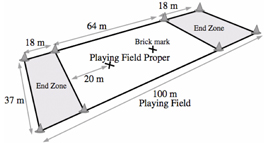
Spirit of the game:
Ultimate relies upon a Spirit of the Game that places the responsibility for fair play on every player. There are no referees; the players are solely responsible for following and enforcing the rules, even at World Championship. Competitive play is encouraged, but never at the expense of respect between players, adherence to the rules, and the basic joy of play.
This sheet provides an outline of the rules only. If you want to participate in official competitions, you should become familiar with the official WFDF rules, which you can find on the WFDF website. In addition, experienced players will gladly teach players the rules and good spirit, so don’t be scared to ask.
Ultimate in 10 Simple Rules:
1)The Field: A rectangular shape with end zones at each end. A regulation field is 70 yards by 40 yards, with end zones 25 yards deep.
2)Initiate Play: Each point begins with both teams lining up on the front of their respective end zone line. The defense throws ("pulls") the disc to the offense. A regulation game has seven players per team.
3)Scoring: Each time the offense completes a pass in the defense's end zone, the offense scores a point. Play is initiated after each score.
4)Movement of the Disc: The disc may be advanced in any direction by completing a pass to a teammate. Players may not run with the disc. The person with the disc ("thrower") has ten seconds to throw the disc. The defender guarding the thrower ("marker") counts out the stall count.
5)Change of Possession: When a pass is not completed (e.g. out of bounds, drop, block, interception, stalled), the defense immediately takes possession of the disc and becomes the offense.
6)Substitutions: Players not in the game may replace players in the game after a score and during an injury timeout.
7)Non-contact: No physical contact is allowed between players. Picks and screens are also prohibited. A foul occurs when contact is made.
8)Fouls: When a player initiates contact on another player a foul occurs. When a foul disrupts possession, the play resumes as if the possession was retained. If the player committing the foul disagrees with the foul call, the play is redone.
9)Self-Officiating: Players are responsible for their own foul and line calls. Players resolve their own disputes.
10)Spirit of the Game: Ultimate stresses sportsmanship and fair play. Competitive play is encouraged, but never at the expense of respect between players, adherence to the rules, and the basic joy of play.
Ultimate in 10 Basic Rules:
- The Pull
- In-bounds and out-of-bounds
- No running with the disc
- The 10-second rule
- Turnovers
- Fouls, Violations and Infractions
- Making a Call
- Scoring
- Substitution of players
Detailed Ultimate (sport) Rules Can Be Downloaded From Documents
Equipments Need For Ultimate (sport)
Flying Disc (disc, frisbee):
A flying disc is a disc-shaped gliding toy or sporting item that is generally plastic and roughly 20 to 25 centimetres (8 to 10 in) in diameter with a lip, used recreationally and competitively for throwing and catching, for example, in flying disc games. The shape of the disc, an airfoil in cross-section, allows it to fly by generating lift as it moves through the air while spinning. The term Frisbee, often used to generically describe all flying discs, is a registered trademark of the Wham-O toy company. Though such use is not encouraged by the company, the common use of the name as a generic term has put the trademark in jeopardy; accordingly, many "Frisbee" games are now known as "disc" games, like Ultimate or disc golf.
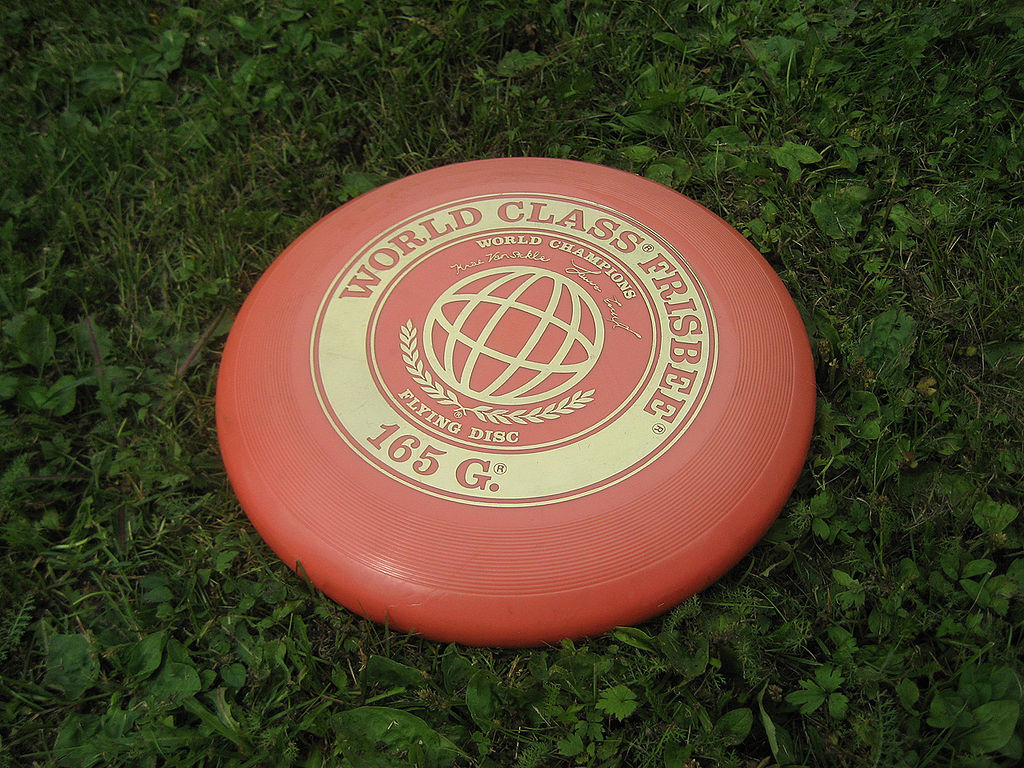
History Of Ultimate (sport)
The History of Ultimate Frisbee:
The ultimate frisbee history begins with Joel Silver, a graduate of Lafayette College, proposed a school Frisbee team on a whim in the fall of 1968. The following spring, a group of students got together to play what Silver claimed to be the "ultimate game experience," adapting the sport from a form of Frisbee football, likely learned from Jared Kass while attending a summer camp at Northfield Mount Hermon, Massachusetts where Kass was teaching. The students who played and codified the rules at Columbia High School in Maplewood, New Jersey, were an eclectic group of students including leaders in academics, student politics, the student newspaper, and school dramatic productions. One member of the original team was Walter Sabo, who went on to be a major figure in the American radio business. The sport became identified as a counterculture activity. The first definitive history of the sport was published in December 2005, ULTIMATE: The First Four Decades.
While the rules governing movement and scoring of the disc have not changed through Frisbee History, the early Columbia High School games had sidelines that were defined by the parking lot of the school and team sizes based on the number of players that showed up. Gentlemanly behavior and gracefulness were held high. (A foul was defined as contact "sufficient to arouse the ire of the player fouled.") No referees were present, which still holds true today: all ultimate matches (even at high level events) are self-officiated. At higher levels of play 'observers' are often present. Observers only make calls when appealed to by one of the teams, at which point the result is binding.
Etymology:
The name Frisbee is accepted by most sources to originate from one William Russell Frisbie of Bridgeport, Connecticut (Johnson, 1975; Malafronte, 1998; Iocovella, 2004; Leonardo and Zagoria, 2004). Following the end of the American Civil War, William Russell Frisbie moved to Bridgeport to manage a new bakery, which he subsequently bought and renamed, the Frisbie Pie Company.
Major Steps in History of Ultimate:
In 1968 Joel Silver introduced his idea of Ultimate Frisbee to the Columbia High School student council in Maplewood New Jersey, USA. The next year, the first game was played between two groups of students. They used a Wham-O Master disc.
In 1969 a team had been formed at the school and they played in a parking lot. The only lines that existed were the goal lines, usually marked by the telephone poles or piles of the players' coats.
First set of rules:
The first and second set of rules were written in 1970 by Joel Silver, Buzzy Hellring and Jon Hines. On Nov 7th, CHS played the first interscholastic game. They won over Millburn High School by a score of 43 to 10.
First College:
The first college ultimate game was played between Rutgers and Princeton on November 6, 1972. Rutgers won the game 29-27. The two universities had played the first intercollegiate football game on the same ground exactly 103 years earlier. Rutgers also won that game by 2.
The first organised tournament, The National Collegiate Championships, was played on April 25th in 1975. Eight teams took part in a tournament in Yale. Rutgers University won the final against Rensselaer Polytechnic Institute with 28-24. In 1976 the Yale tournament was expanded and renamed into the National Ultimate Frisbee Championship. Rutgers won again.
The Ultimate Frisbee History of Club and International Play:
In California ultimate clubs were sprouting in the Los Angeles - Santa Barbara area, while in the east, where the sport developed at the high school and college level, the first college graduates were beginning to found club teams, such as the Philadelphia Frisbee Club, the Washington Area Frisbee Club, the Knights of Nee in New Jersey, the Hostages in Boston and so forth. Arkansas also has a few formidable teams located in the towns of Pocahontas, Newport, and Batesville.
In the same year, ultimate arrived in the United Kingdom, with the UK's first clubs forming at the University of Warwick and the University of Cambridge, and Purley high school, by the late 1970s and early 1980s there were also clubs at the University of Southampton, University of Leicester, and University of Bradford.
Origin Of Ultimate (sport)
In 1968 Joel Silver introduced his idea of Ultimate Frisbee to the Columbia High School student council in Maplewood New Jersey, USA. The next year, the first game was played between two groups of students.
The early days (late 1960s):
While the exact origins of Ultimate contain some debate and uncertainty, it is generally believed that teenagers from Columbia High School (Maplewood, New Jersey)were the first to play the precursor to ultimate initially as an evening pastime. Joel Silver proposed a school Frisbee team on a whim in the fall of 1968. The following spring, a group of students got together to play what Silver claimed to be the "ultimate sports experience," adapting the game from a form of frisbee football, learned from Jared Kass while attending a summer camp in Mount Hermon, Massachusetts|Mount Hermon, Massachusetts where Kass was teaching. The name "Ultimate" comes directly from Kass, who came up with the name, when asked by a student, on the whim that it was the ultimate sport. Kass created the game with a group of friends while at Amherst College.The students who played and codified the rules at Columbia High School were not the athletes of the school, but an eclectic group of students that represented leaders in academics, student politics, the student newspaper, and school dramatic productions. As such, the sport became identified as a counter culture activity. The first definitive history of the sport was published in December 2005, "ULTIMATE--The First Four Decades."
While the rules governing movement and scoring of the disc have not changed, the early Columbia High games had sidelines that were defined by the parking lot of the school and team sizes based on the number of players that showed up. Gentlemanly behavior and gracefulness was held high. (A foul was defined as contact "sufficient to arouse the ire of the player fouled.") No referees were present, which remarkably still holds true today as all Ultimate matches (even at high level events) are self-officiated, though at higher levels of play 'observers' are often utilized. An observer is different from a referee in that he does not typically actively make a call. Observers only make calls when appealed to by one of the teams, at which point the result is binding.
Ultimate goes to college – 1970:
The first collegiate Ultimate club was formed by Joel Silver when he arrived at Lafayette College in 1970
First Intercollegiate Competition:
The first intercollegiate competition was held at Rutgers University|Rutgers' New Brunswick campus between Rutgers and Princeton University|Princeton on November 6, 1972, the 103rd anniversary of the History of American football#Rutgers v. Princeton.2C 1869|first intercollegiate game of American football featuring the same schools competing in the same location.
Intercollegiate Ultimate Frisbee Championships:
By 1975 dozens of colleges had teams, and in April of that year players organized the first ever Ultimate tournament, an eight-team invitational called the "Intercollegiate Ultimate Frisbee Championships," to be played at Yale. Rutgers beat Rensselaer Polytechnic Institute|Rensselaer Polytech (RPI), 26-23, in the finals.
National Ultimate Frisbee Championships:
By 1976 teams were popping up in areas outside the Northeast. A 16-team single elimination tournament was set up, at Amherst, Massachusetts, to include 13 East Coast teams and 3 Midwest teams. Rutgers again took the title, beating Hampshire College in the finals. Penn State and Princeton University|Princeton were the other semi-finalists. While it was called the "National Ultimate Frisbee Championships", Ultimate was starting to appear in the Los Angeles and Santa Barbara, California|Santa Barbara area.
Penn State hosted the first five-region National Ultimate Championships in May of 1979. There were five regional representatives, three college and two club teams. They were as follows: Cornell University-(Northeast), Rowan University|Glassboro State-(Middle Atlantic), Michigan State-(Central), Orlando Fling-(South), Santa Barbara Condors-(West). Each team played the other in a round robin format to produce a Glassboro-Condors final. The Condors had gone undefeated up to this point, however Glassboro prevailed 19-18 to become the 1979 National Champions. They repeated as champions in 1980 as well.
Ultimate spreads to clubs and internationally – 1976:
In California clubs were sprouting in the LA - Santa Barbara area, while in the east, where the game developed at the high school and then college level, the first college graduates were beginning to found club teams, such as the Philadelphia Frisbee Club, the Washington Area Frisbee Club, the Knights of Nee in NJ, and so forth.
In the same year, Ultimate arrived in the United Kingdom, with clubs forming at the University of Warwick, University of Cambridge, University of Leicester, Purley High School and in Bournemouth.
In 1975, Ultimate is introduced at the Canadian Open Frisbee Championships, Toronto, as a showcase event. League play begins in Toronto in 1979.
The Toronto Ultimate Club is a not-for-profit organization dedicated to serving the needs of Ultimate players in Toronto since 1979. 3300 members with over 250 teams playing year round. This was the first Ultimate league in Canada.
Ultimate gets organized – the UPA – 1979–80:
In 1979 and 1980 the Ultimate Players Association was formed. The UPA organized regional tournaments and has crowned a national champion every year since 1979.
The popularity of the game quickly spread, taking hold as a free-spirited alternative to traditional organized sports. In recent years college Ultimate has attracted a greater number of traditional athletes, raising the level of competition and athleticism, and providing a challenge to its laid back, free-spirited roots.
Governing Bodies
World Flying Disc Federation:
The World Flying Disc Federation (WFDF) is the international governing body for flying disc sports, with responsibility for sanctioning world championship events, establishing uniform rules, setting of standards for and recording of world records. WFDF is a federation of member associations which represent flying disc sports and their athletes in 58 countries. WFDF is an international federation recognized by the International Olympic Committee (IOC), a member of ARISF, SportAccord and the International World Games Association, and it is a registered not-for-profit 501(c)(3)corporation in the state of Colorado, USA.

The World Flying Disc Federation (“WFDF”) serves as the international governing body of all flying disc sports, with responsibility for sanctioning world championship and other international flying disc events, establishing uniform rules, and setting standards for and recording of world records. It acts
- to promote and protect the “spirit of the game” of flying disc sports play;
- to encourage flying disc sports play throughout the world and foster the establishment of new national flying disc sports associations, advising them on all flying disc sports activities and general management;
- to promote and raise public awareness of and lobby for official recognition of flying disc play as sport; and to provide an international forum for discussion of all aspects of flying disc sports play.
Membership:
WFDF has member associations in 62 countries, from Africa, Asia, Australia, Europe, North America, The Caribbean and South America. WFDF is a not-for-profit corporation, incorporated in Colorado, USA, and it was formed in 1985. Disc sports represented include: Ultimate (outdoor, indoor, beach), disc golf, field events (distance, accuracy, self caught flight, discathon), guts frisbee, double disc court, and freestyle. WFDF is a member of SportAccord (formerly known as GAISF), The International World Games Association (IWGA), and the International Council of Sport Science and Physical Education (ICSSPE). In May 2013, under the leadership of WFDF President Robert L. "Nob" Rauch, WFDF was granted provisional recognition by the International Olympic Committee and gained full IOC recognition on August 2nd, 2015. It is now one of 35 sports that are members of the Association of IOC Recognised International Sports Federations.
WFDF presidents:
- Charlie Mead (GB) 1985–1986
- Daniel "Stork" Roddick (USA) 1987–1991
- Robert L. "Nob" Rauch (USA) 1992–1994
- Bill Wright (USA) 1995–2004
- Juha Jalovaara (FIN) 2005–2008
- Jonathan Potts (AUS) 2009–2010
- Robert L. "Nob" Rauch (USA) 2011–Present
Awards Related To Ultimate (sport)
Ultimate Sport Federation Awards:
The SportBusiness Ultimate Sports Federations Awards were launched following the success of the SportBusiness Ultimate Sports Cities Awards and Rankings that have been held every two years since 2006. The process involved analysing an initial cut of 30 international federations and associations and then asking them to complete a detailed survey across nine key categories. These surveys were then analysed by a panel of external judges who are all experts in their respective fields. The results will be used to create a benchmark of excellence for international federations and foster industry best practice through the learnings that will be generated by the Awards.
Ultimate Sports City Awards:
The cities featuring in the latest shortlist include the top 15 ranking cities from the 2012 edition of Ultimate Sports Cities followed by the 10 top ranking cities based on events held between 2010 and 2018 (that did not appear in the top 15 already selected) as well as five ‘wildcard’ entrants voted for by a panel of SportBusiness judges.
As in the past, the shortlisted cities will be evaluated according to the size and volume of events they have hosted between an eight year time period (which has moved on two years to 2010 and 2018 since the last rankings) alongside a range of other criteria including:
• venues
• transport and infrastructure
• accommodation
• event strategy
• government and public support
• legacy
• quality of life
• security
• marketing/promotional ability/branding.
Final Shortlist for Ultimate Sports Cities 2014 (in alphabetical order)
Amsterdam
Auckland
Baku
Beijing
Berlin
Calgary
Cape Town
Copenhagen
Delhi
Doha
Dubai
Glasgow
Istanbul
Kazan
Kuala Lumpur
London
Madrid
Manchester
Melbourne
Moscow
New York
Paris
Rio de Janeiro
Sao Paulo
Singapore
Sochi
Sydney
Tokyo
Vancouver
Warsaw
SportBusiness Ultimate Sports Federations / Associations Awards:
The Winners by Category:
Overall Winner – Ultimate Sports Federation of 2015
FIBA
Events Calendar and Strategy
FIBA
Global Popularity and Expansion
ITTF
Marketing and Communications
FEI
Commercial
FIBA
Branding
FIH
Innovation (joint winners)
FIBA
ICC
Governance and Transparency
IOC
Legacy/Environment
FIS
Inclusivity
IPC
The Clubbies Awards:
The Clubbies Awards recognises the outstanding achievements of players, coaches and officials at grassroots club level. These awards have been introduced by The Confederation of Australian Sport and Inside Sport (Australia's leading sports magazine) aimed at recognizing the outstanding contribution made to grassroots sport by the large army of volunteers around the country.
How does it work?
The Clubbies Awards are open to all teams, clubs and individuals in Australia. There will be six categories:
1. Best Coach
2. Best Player
3. Best Stalwart
4. Best Team
5. Best Club
6. Best Sporting Education
Sample Documents Of Ultimate (sport)
-Muhammad Ali

